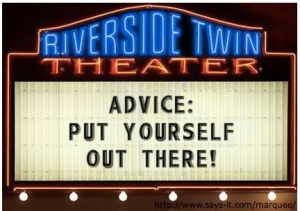We all know how important networking is to our professional lives. It’s been described as the most crucial factor in securing your dream job, getting promoted, embarking on an expat assignment or landing a place in graduate school. If you believe the experts, achieving your personal career goals is all down to networking. A guest post by Lori Peterson
After spending a few years working, I think that statement is probably true. Trouble is, networking, especially early in your career, is terrifying! Who isn’t intimidated by the thought of trying to sound informed, interesting and worthy of a stranger’s time?
What’s more, we often think of networking as an interaction with someone more experienced and important than we are, someone holding a bit of our future in his or her hands – and we have to convince them to hand over. That pressure makes networking even scarier.
Rest assured though: it’s perfectly natural to feel that way. Otherwise there wouldn’t be a market for all of the books, blog posts, conferences and training sessions devoted to making networking successful, comfortable and, dare they say, fun.
I have often thought, though, that these efforts to demystify networking only serve to make it more inaccessible. Advice we get from people who have worked a number of years, while well-meaning, is often vague, daunting and just plain unhelpful. I always felt like these people understood or possessed something I didn’t, and as a result I would never be able to translate their words into actions.
I’ve come to realise, though, that the actual advice is what needs translating. People often dispense networking wisdom in what I like to call networking clichés. Networking clichés are undefinable bits of advice that are spoken universally, but only have meaning when grounded in individual experiences that have combined over time into a picture of what successful networking looks like. Without the benefit of your own context, networking clichés by themselves really don’t mean anything.
I’ll attempt to put five common networking clichés into actual words. Of course, my thoughts are based on my own personal experience, but I hope you’ll find them helpful in getting started on those experiences that will eventually define successful networking for you.
Networking cliché #1: ‘Put yourself out there.’
We’ll go ahead and tackle this one first, as it’s one of the most nebulous pieces of advice ever given. What, exactly, does ‘putting yourself out there’ mean? Just typing that makes me nervous as I think of randomly handing out CVs or shooting off: “Hi, I’m Lori!” emails to people I’ve never met.
To me, putting yourself out there is far less about statically inserting yourself in front of people and far more about just handling your opportunities a bit. As a new graduate, you probably won’t know many of the people you work with. So, the next time you’re at the coffee machine or in the break room, say hi to whomever else is there.
Introducing yourself works of course, but if you’d rather be more subtle, offer a comment about the weather or mention you like the same kind of tea. When people respond (and they will!), engage them. Don’t worry about what you actually say, as these types of interactions are about connection rather than content. As you chat more, it will get easier and then some of those relationships will start to stick.
Networking cliché #2: ‘Find common ground.’
This really shouldn’t say ‘find common ground’ as much as it should say ‘recognise common ground.’ You don’t need to approach people prepared with a list of questions. You’ll be able to find common ground during light chats with just a bit of strategy. Asking someone about upcoming holidays or weekend plans is one general way to open up conversation.
Once you’ve made a connection, don’t be afraid to show some enthusiasm. I remember a particularly engaging interaction I once had with a very senior executive about our mutual love of Nando’s. You’ll both remember each other better if the conversation is more authentic.
Don’t worry about how topics are going to come up, just trust your abilities to create a reaction and discuss interesting things. After all, you do this in your personal life all the time. And if you can’t find anything to talk about, don’t be afraid to excuse yourself and put your efforts into someone you do align with better.
Networking cliché #3: ‘Maintain your contacts.’
The specificity around this networking cliché is often around ‘checking in’ with your contacts so you can seek advice or update them on your achievements. However, just like personal relationships, some professional relationships stick and some don’t. Can you imagine how exhausting it would be to regularly ‘check in’ with every friend you’ve ever made, even those you haven’t been close to in years?
I bet that when you were offered your graduate role, you knew instantly who you wanted to tell about it. As you progress in your career, certain relationships will lend themselves to that kind of purposeful interaction. Then, when you happen to see other people, you can mention what you’re up to and ask how they are as well.
For individuals you really don’t have much contact with, don’t be afraid to reach out if you have something to tell them. But you absolutely don’t need to invent things to ask people just in the interest of networking, nor do you have to actively manage a massive contact database. Just start by prioritising contact with the people currently in your realm, and gradually your reach will broaden.
Networking cliché #4: ‘Prepare your elevator pitch.’
I’d like to scrap the image of cornering people before dazzling them with a nugget of persuasive brilliance, and suggest that you just take some time to think about yourself and what you’re about.
Then, practice getting comfortable communicating that. Being genuine and forthcoming when telling others about yourself will take you much further than a memorised value proposition.
Networking cliché #5: ‘You never get a second chance to make a first impression.’
Well, technically, no. And yes, first impressions are important. But don’t overthink this one. First impressions are often much more subtle than they’re described. Look nice, be nice and smile, and you’re 90% there. Basic behaviours you probably already do quite naturally will create a framework for your natural self to shine.
As an aside, don’t worry too much about so-called ‘missed’ opportunities. Your network will grow organically, and no one moment will be so crucial that it upsets everything else. Rest assured that opportunities to connect come along more often than you think, and as you learn to recognise them, things will progress naturally and positively.
Networking doesn’t deserve an enigmatic pedestal. It is a very embedded part of the working world and requires only a willingness to share with other people. Make small goals, such as talking to one new person on a given day, and then mentally congratulate yourself when you’ve achieved them. At your own pace and in your own time, you’ll soon have a healthy circle of genuine contacts.
Lori is a Futureboard graduate working for a major oil company. Read more about her here.
Pictures by: Lori Peterson; theyec.org, Geology Rocks; largestmixer; etsy; ncoachcorner;